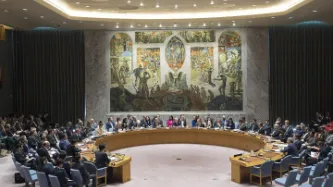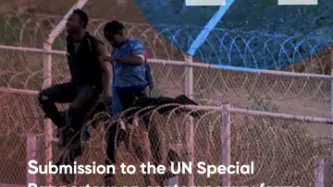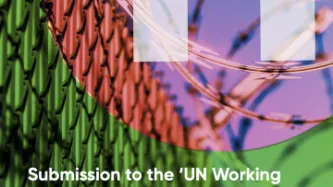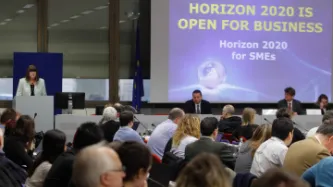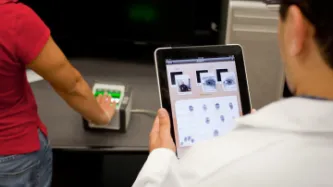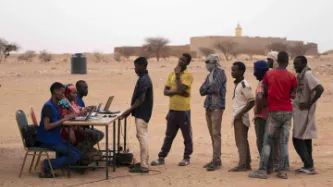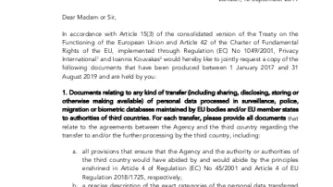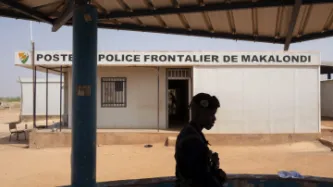Search
Content type: News & Analysis
A new report by the UN Working Group on mercenaries analyses the impact of the use of private military and security services in immigration and border management on the rights of migrants, and highlights the responsibilities of private actors in human rights abuses as well as lack of oversight and, ultimately, of accountability of the system.
Governments worldwide have prioritised an approach to immigration that criminalises the act of migration and focuses on security.
Today, borders are not…
Content type: Explainer
In the name of reinforcing migration control and increasing security, the EU is introducing a host of new surveillance measures aimed at short-term visitors to the Schengen area. New tools and technologies being introduced as part of the visa application process and the incoming “travel authorisation” requirement include automated profiling systems, a ‘pre-crime’ watchlist, and the automated cross-checking of numerous national, European and international databases. There are significant risks…
Content type: News & Analysis
The UN Special Rapporteur on the promotion and protection of human rights and fundamental freedoms while countering terrorism, Professor Fionnuala Ní Aoláin together with Dr. Krisztina Huszti-Orbán, released today a key report on the “Use of Biometric Data to Identify Terrorists: Best Practice or Risky Business?”.
The report explores the human rights risks involved in the deployment of biometrics emphasising that
in the absence of robust rights protections which are institutionally embedded…
Content type: Long Read
Over the last two decades we have seen an array of digital technologies being deployed in the context of border controls and immigration enforcement, with surveillance practices and data-driven immigration policies routinely leading to discriminatory treatment of people and undermining peoples’ dignity.And yet this is happening with little public scrutiny, often in a regulatory or legal void and without understanding and consideration to the impact on migrant communities at the border and…
Content type: Advocacy
Privacy International (PI), Fundaciòn Datos Protegidos, Red en Defensa de los Derechos Digitales (R3D) and Statewatch responded to the call for submission of the UN Special Rapporteur on contemporary forms of racism, xenophobia and related intolerance on how digital technologies deployed in the context of border enforcement and administration reproduce, reinforce, and compound racial discrimination.
This submission provides information on specific digital technologies in service of border…
Content type: Examples
Amazon has spent $10 million to buy 1,500 cameras to take the temperature of workers from the Chinese firm Zhejiang Dahua Technology Company even though the US previously blacklisted Dahua because it was alleged to have helped China detain and monitor the Uighurs and other Muslim minorities.
The cameras work by comparing a person’s radiation with a separate infrared calibration device and uses face detection technology to make sure it is looking for heat in the right part of the subjects…
Content type: Advocacy
Privacy International responded to the call for submissions of the Working Group on the use of mercenaries as a means of violating human rights and impeding the exercise of the rights of peoples to self-determination on role of private military and security companies in immigration and border management and the impact on the protection of the rights of all migrants.
This submission builds on PI’s research and reporting highlighting examples of the involvement of private companies in…
Content type: Examples
New versions of drones that currently issue audio warnings reminding people in Elizabeth, New Jersey to observe social distancing guidelines will incorporate sensors and fever-detecting cameras that will monitor if people are sick or failing to social distance on the trails and in the parks of Meriden, Connecticut, according to the commercial drone company Draganfly, which claims the cameras can also detect sneezing and heart and respiratory rates. The company expects to conduct pilot…
Content type: Examples
The Guangzhou Public Transportation Group has installed a biometric tablet next to bus drivers' seats so they can check the temperature and identity of every passenger who boards. The tablets will also photograph each passenger, allowing them to be identified by China's facial recognition network in the hope of helping control the spread of the novel coronavirus by enabling contact tracing for anyone displaying symptoms. The Group claims the data so gathered will only be used in the interests…
Content type: Examples
The Bangladeshi start-up Sigmind.ai has developed the WATCHCAM Mass Surveillance System, which it claims can recognise individuals even when they're wearing a mask with 87.3% accuracy - and 99.4% if they're not wearing a mask. The company began developing the system in 2019 to provide ATM security, but it now marketing it for contact tracing, help track down infected people, and enforce quarantine.
Source: https://www.dhakatribune.com/bangladesh/2020/04/07/bangladeshi-developers-devise-a…
Content type: Case Study
In Peru, you get asked for your fingerprint and your ID constantly - when you’re getting a new phone line installed or depositing money in your bank account – and every Peruvian person has an ID card, and is included in the National Registry of Identity – a huge database designed to prove that everyone is who they say they are. After all, you can change your name, but not your fingerprint.
However, in 2019 the National Police of Peru uncovered a criminal operation that was doing just that:…
Content type: Case Study
Having a right to a nationality isn’t predicated on giving up your right to privacy - and allowing whichever government runs that country to have as much information as they want. It is about having a fundamental right to government protection.
For the first time since 1951, Assam - a state in the north east of India - has been updating its national register of citizens (NRC), a list of everyone in Assam that the government considers to be an Indian citizen. The final version, published in…
Content type: Examples
China: Manufacturer Telepower adds fever detection and facial recognition to point-of-sale terminals
According to a company announcement, Telepower Communication (Telpo), a leading Chinese manufacturer of smart point-of-sale systems and intelligent hardware, has integrated into its terminals new features to support a wide variety of contactless use cases. The company’s family of terminals for catering, retail, payment, security, and other applications, include biometric, fever-detecting facial recognition, and ticket validation technology. The technology supports accurate identification of up…
Content type: News & Analysis
Unlikely as it may seem, the UN institution that has one of the greatest potential to impact upon people’s rights around the world is now the UN Statistics Division. And why is that?
Last week, they had a crucial meeting where they endorsed the UN’s Legal Identity Agenda and the UN’s Legal Identity Task Force. The stakes could hardly be higher. One of the UN’s Sustainable Development Goals, SDG 16.9, states that “by 2030 provide legal identity for all including free birth…
Content type: Long Read
The UK’s Metropolitan Police have began formally deploying Live Facial Recognition technology across London, claiming that it will only be used to identify serious criminals on “bespoke ‘watch lists’” and on “small, targeted” areas.
Yet, at the same time, the UK’s largest police force is also listed as a collaborator in a UK government-funded research programme explicitly intended to "develop unconstrained face recognition technology", aimed “at making face…
Content type: Long Read
Background
Kenya’s National Integrated Identity Management Scheme (NIIMS) is a biometric database of the Kenyan population, that will eventually be used to give every person in the country a unique “Huduma Namba” for accessing services. This system has the aim of being the “single point of truth”, a biometric population register of every citizen and resident in the country, that then links to multiple databases across government and, potentially, the private sector.
NIIMS was introduced…
Content type: News & Analysis
On 30 January 2020, Kenya’s High Court handed down its judgment on the validity of the implementation of the National Integrated Identity Management System (NIIMS), known as the Huduma Namba. Privacy International submitted an expert witness testimony in the case. We await the final text of the judgment, but the summaries presented by the judges in Court outline the key findings of the Court. Whilst there is much there that is disappointing, the Court found that the implementation of NIIMS…
Content type: Long Read
It was a quiet evening in Agadez, a bustling Saharan city in the centre of Niger. Thirty-five year old Agali Ahmed was sipping tea at a friend’s place, as he often did, when he received a message: police were at his uncle’s house. When he got there, Ahmed saw men in plainclothes, standing around the building’s gate. Inside, more men were searching the apartment. Three white men, who Ahmed guessed were Spanish, asked for his phone and started taking pictures of him. They told him to follow them…
Content type: Long Read
The European Union (EU) spends billions on research and development aimed at driving economic growth and jobs, as well as furthering the bloc’s broader agenda. Within the current budget, known as Horizon 2020 and covering the years 2014-2020, some €80 billion has been made available for research in a huge number of areas, ranging from finding cures for diseases to helping keep the earth viable for life.
From the same budget, it also funds a lot of projects aimed at developing surveillance…
Content type: News & Analysis
Updated January 18th 2021
The Government of Myanmar is pushing ahead with plans to require anyone buying a mobile SIM card to be fingerprinted and hand over their ID cards, according to procurement documents circulated to prospective bidders.
The plans are a serious threat to privacy in a country lacking any data protection or surveillance laws and where minorities are systematically persecuted, and must be scrapped.
According to technical requirements developed by Myanmar’s Post and…
Content type: Long Read
Sitting on the ground inside an unadorned courtyard in Koira Tegui, one of Niamey’s most popular districts, Halimatou Hamadou shows a copy of what, she’s been told, is a certificate of birth.
The 33 year old woman, who’s unable to read and write, received it days earlier during a crowded public ceremony at a nearby primary school.
“It’s my first document ever,'' she says, with surprise.
Thanks to the paper, she’ll be able to take part in a crucial passage for the future of Niger: the…
Content type: News & Analysis
Photo by Ray Witlin / World Bank CC BY-NC-ND 2.0
This article has been written by Ambika Tandon, Policy Officer at the Centre for Internet and Society, in collaboration with Privacy International.
On October 17th 2019, the UN Special Rapporteur (UNSR) on Extreme Poverty and Human Rights, Philip Alston, released his thematic report on digital technology, social protection and human rights. Understanding the impact of technology on the provision of social protection – and, by extent, its…
Content type: Report
In September 2019, Privacy International filed 10 access to documents requests to EU bodies regarding the transfer of surveillance capabilities to non-EU countries. The requests seek documents providing information on the transfer of personal data, surveillance technology, training, financing, and legislation to non-EU countries. The requests were submitted to:
Frontex
Europol
The European Union Agency for Law Enforcement Training
The Directorate-General for Economic and…
Content type: News & Analysis
Photo: The European Union
“Border Externalisation”, the transfer of border controls to foreign countries, has in the last few years become the main instrument through which the European Union seeks to stop migratory flows to Europe. Similar to the strategy being implemented under Trump’s administration, it relies on utilising modern technology, training, and equipping authorities in third countries to export the border far beyond its shores.
It is enabled by the adoption…
Content type: News & Analysis
Photo by Francesco Bellina
The wars on terror and migration have seen international funders sponsoring numerous border control missions across the Sahel region of Africa. Many of these rely on funds supposed to be reserved for development aid and lack vital transparency safeguards. In the first of a series, freelance journalist Giacomo Zandonini sets the scene from Niger.
Surrounded by a straw-yellow stretch of sand, the immense base of the border control mobile company of Maradi, in southern…
Content type: News & Analysis
Photo: The European Union
On 2 September 2019, Privacy International, together with 60 other organisations, signed an open letter to the European Parliament to express our deep concern about upcoming EU policy proposals which undermine the EU’s founding values of human rights, peace and disarmament.
Since 2017, the EU has diverted funds towards security research and security capacity-building in countries around the world. The proposal for the EU's next budget (2021-2027) will…
Content type: Examples
New workplace technologies are generating mountains of data on workers despite a lack of clarity over how the data is used and who owns it. In offices, smart badges track interactions and sensors track fitness and health; in trucks sensors monitor drivers' performance in the name of safety. In the US state of Illinois, between July and October 2017 26 lawsuits were filed by employees alleging that their employers had violated the state's Biometric Information Privacy Act, which requires a…
Content type: Examples
In February 2019, the World Food Programme, a United Nations aid agency, announced a five-year, $45 million partnership with the data analytics company Palantir. WFP, the world's largest humanitarian organisation focusing on hunger and food security, hoped that Palantir, better known for partnering with police and surveillance agencies, could help analyse large amounts of data to create new insights from the data WFP collects from the 90 million people in 80 countries to whom it distributes 3…
Content type: News & Analysis
Picture Credit: US AID
US President Trump has been cutting aid to Central America, including a surprise cut of approximately $500m in aid to the “Northern Triangle” countries of El Salvador, Guatemala, and Honduras, apparently as punishment for “doing absolutely nothing” to prevent emigration to the US.
What remains of the funds is largely and deliberately being repurposed for spending on the US’s own security interests: indeed, one area which his…
Content type: News & Analysis
Foto: US AID
El presidente estadounidense Trump ha estado recortando la ayuda a Centroamérica, incluyendo un recorte sorpresivo de aproximadamente 500 millones de dólares a los países del “Triángulo del Norte” (El Salvador, Guatemala y Honduras), al parecer como castigo por “no haber hecho absolutamente nada” para impedir la emigración hacia los Estados Unidos.
Los fondos restantes están siendo reorientados,en su gran mayoría y deliberadamente, al gasto para…


